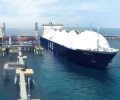

Demand has jumped for relatively cheap Canadian natural gas, driving exports to the United States to three-year highs and prompting producers in Canada to boost capital spending and drilling activity.
Global natural gas prices have hit multi-year highs as world economies recover from last year’s slowdown during the pandemic. Now, natural gas stockpiles in Europe are dangerously low and demand in Asia has been insatiable, so utilities around the world are competing for liquefied natural gas (LNG) exports.
Canada’s gas is remote, and prices at the AECO hub in Alberta are among the cheapest in North America, with production far from major U.S. demand centers and LNG export terminals in the U.S. Gulf Coast, some 2,500 miles (4,023 km) away. Canada has no LNG export terminals.
Still, at around C$5 ($4.12) per million British thermal units (mmBtu), AECO prices are well above their 2021 year-to-date average of C$3.38 ($2.73), and some of Canada’s largest gas producers including Tourmaline Oil Corp are seeking to capitalize.
“A number of producers are accelerating capital into Q4 (fourth quarter) to add production volumes into the higher-priced winter market,” said Matt Murphy, an analyst at Tudor, Pickering, Holt & Co (TPH) in Calgary.
Gas receipts into TC Energy (NYSE:TRP)’s NGTL pipeline system hit an all-time high of 12.75 billion cubic feet per day (bcfd) in mid-October, according to TPH records dating from 2013. The NGTL system is the main artery shipping western Canadian gas to market, and can be used as a proxy for output from the region.
TPH is forecasting further gas receipt growth to 12.9 bcfd in December, with new highs in 2022.
Data provider Refinitiv said Canadian exports to the United States averaged 8.3 bcfd year-to-date, the highest over that time period since 2018. In 2020, Canadian exports hit their lowest level since 1993 because of the pandemic, according to U.S. Energy Information Administration data.
The increase in drilling activity in Canada contrasts with a more cautious approach among U.S. gas producers, who are still being careful with their capital after the pandemic decimated demand in 2020 and left the industry on its knees.
The Canadian gas rig count is currently 70, up 75% from this time last year, while U.S. gas rigs are up about 32% to 98 over the same period, according to energy services firm Baker Hughes Co.
Tourmaline, Canada’s largest gas producer, is accelerating drilling in the second half and bringing capital spending originally earmarked for 2022 into this year, according to a company presentation in September.
“The company will monitor natural gas supply/demand balances and schedule new production startups appropriately through the course of winter and the balance of 2022,” Tourmaline said.
The company expects to produce on average 500,000-510,000 barrels of oil equivalent next year, up from 440,000-445,000 in 2021.
Other major Canadian gas producers increasing activity include Canadian Natural (NYSE:CNQ) Resources Ltd and ARC Resources, industry analysts said. ARC declined to comment and CNRL did not respond to a request for comment.
However, a shortage of skilled crews to operate drilling rigs in Canada could limit how much gas output climbs, and some producers remain cautious that increased supply may rein in prices.
“How do we do more even if we wanted to do more? We’re at a limit on the people that we have,” said Darren Gee, Chief Executive of Peyto Exploration and Development Corp.
Source: Reuters